AWM41 1072 - [Official History, 1914-18 War: Records of Arthur G Butler:] Interviews containing accounts of Nursing experiences in the AANS [Australian Army Nursing Service]. These nurses were interviewed by Matron Kellett - Part 5
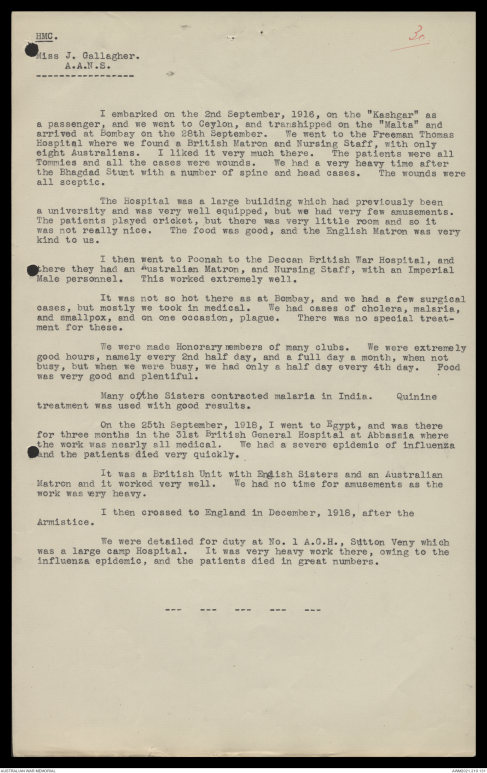
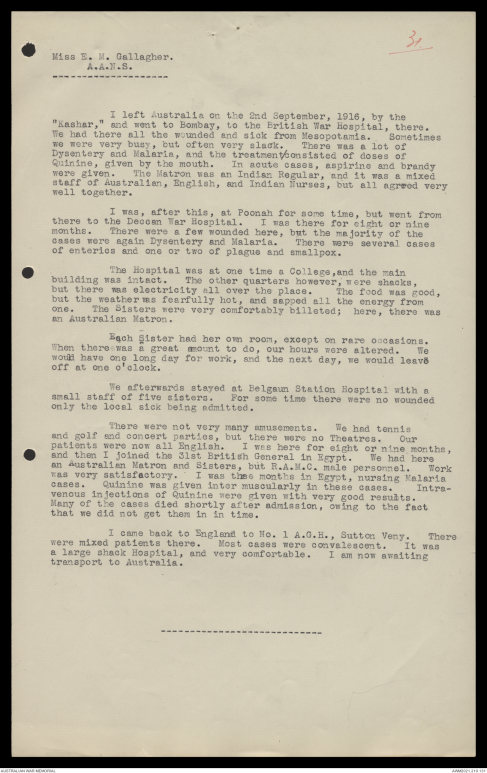
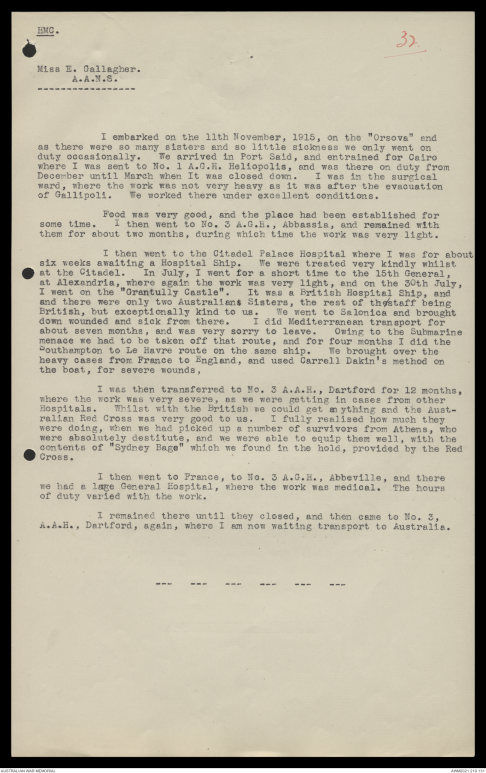
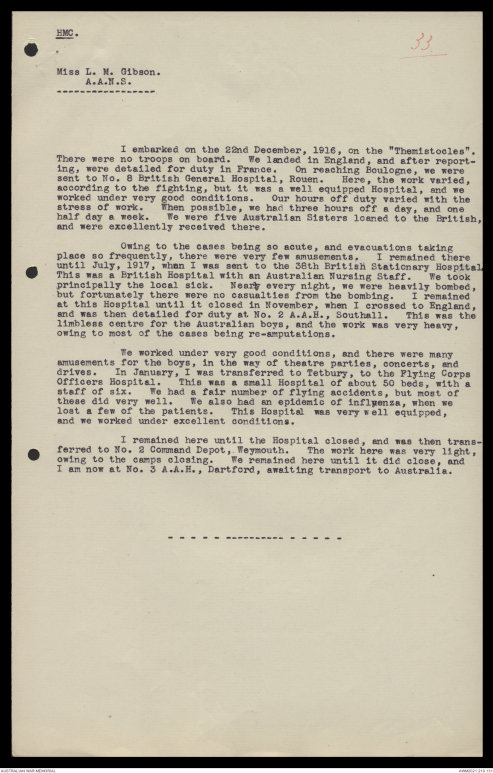
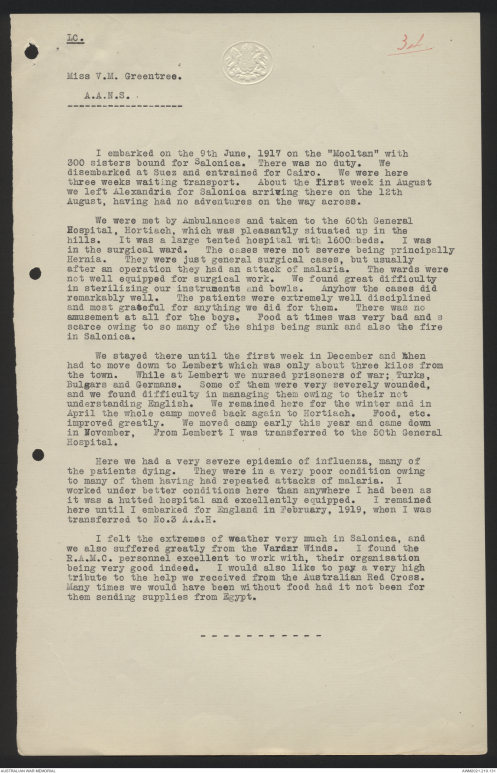
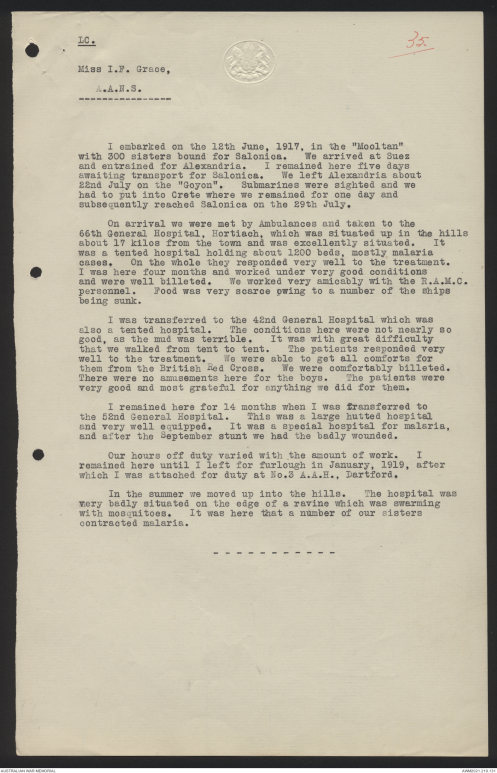
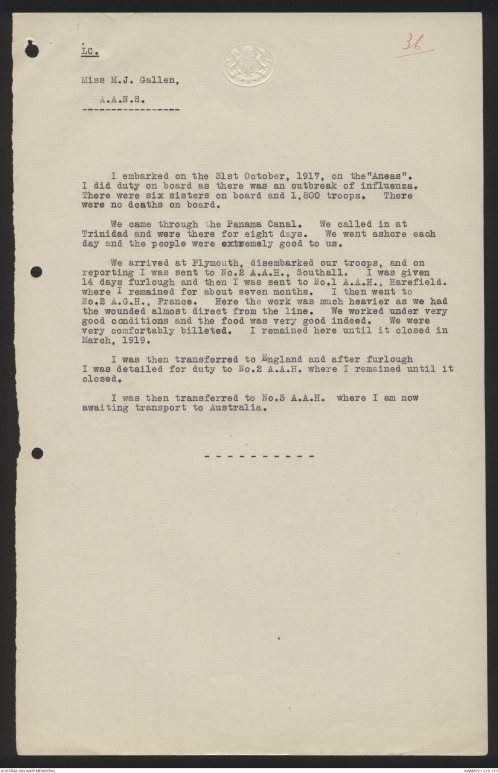
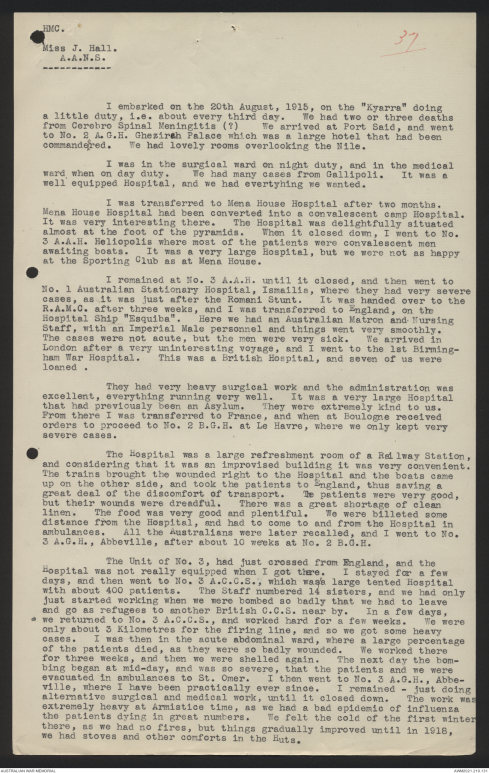
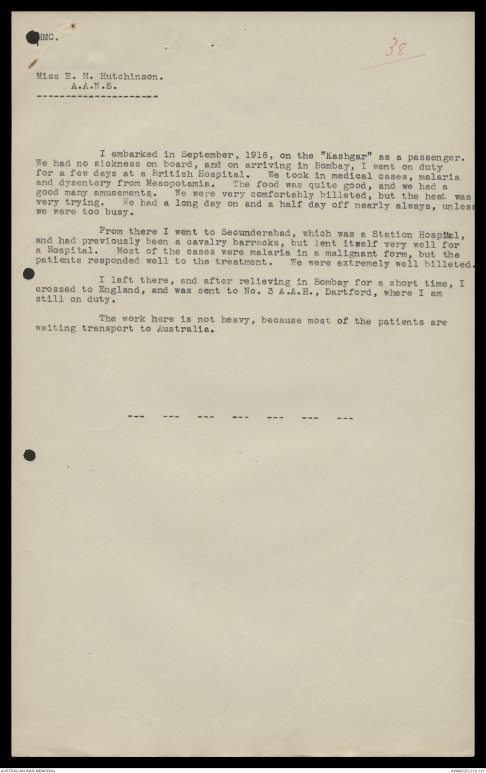
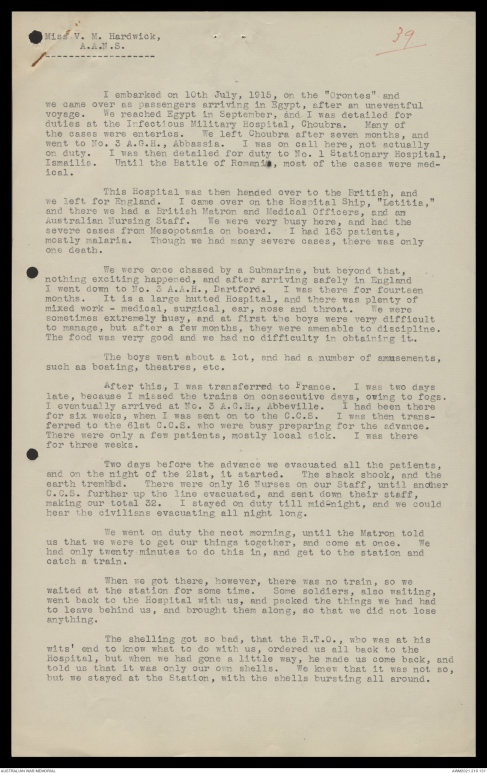
HMC [*30*]
Miss J. Gallagher,
A.A.N.S.
----------------------
I embarked on the 2nd September, 1916, on the "Kashgar" as
a passenger, and we went to Ceylon, and transhipped on the "Malta" and
arrived at Bombay on the 28th September. We went to the Freeman Thomas
Hospital where we found a British Matron and Nursing Staff, with only
eight Australians. I liked it very much there. The patients were all
Tommies and all the cases were wounds. We had a very heavy time after
the Bhagdad Stunt with a number of spine and head cases. The wounds were
all sceptic.
The Hospital was a large building which had previously been
a university and was very well equipped, but we had very few amusements.
The patients played cricket, but there was very little room and so it
was not really nice. The food was good, and the English Matron was very
kind to us.
I then went to Poonah to the Deccan British War Hospital, and
there they had an Australian Matron, and Nursing Staff, with an Imperial
Male personnel. This worked extremely well.
It was not so hot there as at Bombay, and we had a few surgical
cases, but mostly we took in medical. We had cases of cholera, malaria,
and smallpox, and on one occasion, plague. There was no special treatment
for these.
We were made Honorary members of many clubs. We were extremely
good hours, namely every 2nd half day, and a full day a month, when not
busy, but when we were busy, we had only a half day every 4th day. Food
was very good and plentiful.
Many of/the Sisters contracted malaria in India. Quinine
treatment was used with good results.
On the 25th September, 1918, I went to Egypt, and was there
for three months in the 31st British General Hospital at Abbassia where
the work was nearly all medical. We had a severe epidemic of influenza
and the patients died very quickly.
It was a British Unit with English Sisters and an Australian
Matron and it worked very well. We had no time for amusement as the
work was very heavy.
I then crossed to England in December, 1918, after the
Armistice.
We were detailed for the duty at No. 1 A.G.H., Sutton Veny which
was a large camp Hospital. It was very heavy work there, owing to the
influenza epidemic, and the patients died in great numbers.
--- --- --- --- ---
[*31*]
Miss E. M. Gallagher.
A.A.N.S.
--------------------------
I left Australia on the 2nd September, 1916, by the
"Kashar," and went to Bombay, to the British War Hospital, there.
We had there all the wounded and sick from Mesopotamia. Sometimes
we were very busy, but often very slack. There was a lot of
Dysentery and Malaria, and the treatment/consisted of doses of
Quinine, given by the mouth. In acute cases, aspirine and brandy
were given. The Matron was an Indian Regular, and it was a mixed
staff of Australian, English, and Indian Nurses, but all agreed very
well together.
I was, after this, at Poonah for some time, but went from
there to the Deccan War Hospital. I was there for eight or nine
months. There were a few wounded here, but the majority of the
cases were again Dysentery and Malaria. There were several cases
of enterics and one or two of plague and smallpox.
The Hospital was at one time a College,and the main
building was intact. The other quarters however, were shacks,
but there was electricity all over the place. The food was good,
but the weather was fearfully hot, and sapped all the energy from
one. The Sisters were very comfortably billeted; here, there was
an Australian Matron.
Each Sister had her own room, except on rare occasions.
When there was a great amount to do, our hours were altered. We
would have one long day for work, and the next day, we would leave
off at one o'clock.
We afterwards stayed at Belgaum Station Hospital with a
small staff of five sisters. For some time there were no wounded
only the local sick being admitted.
There were not many amusements. We had tennis
and golf and concert parties, but there were no Theatres. Our
patients were now all English. I was here for eight or nine months,
and then I joined the 31st British General in Egypt. We had here
an Australian Matron and Sisters, but R.A.M.C. male personnel. Work
was very satisfactory. I was thee months in Egypt, nursing Malaria
cases. Quinine was given inter muscularly in these cases. Intravenous
injections of Quinine were given with very good results.
Many of the cases died shortly after admission, owing to the fact
that we did not get them in time.
I came back to No. 1 A.G.H., Sutton Veny. There
were mixed patients there. Most cases were convalescent. It was
a large shack Hospital, and very comfortable. I am now awaiting
transport to Australia.
---------------------------------------------
HMC. [*32*]
Miss Gallagher.
A.A.N.S.
--------------------
I embarked on the 11th November, 1915, on the "Orsova" and
as there were so many sisters and so little sickness we only went on
duty occasionally. We arrived in Port Said, and entrained for Cairo
where I was sent to No. 1 A.G.H. Heliopolis, and was there on duty from
December until March when It was closed down. I was in the surgical
ward, where the work was not very heavy as it was after the evacuation
of Gallipoli. We worked there under excellent conditions.
Food was very good, and the place had been established for
some time. I then went to No. 3 A.G.H., Abbassia, and remained with
them for about two months, during which time the work was very light.
I then went to the Citadel Palace Hospital where I was for about
six weeks awaiting a Hospital Ship. We were treated very kindly whilst
at the Citadel. In July, I went for a short time to the 15th General'
at Alexandria, where again the work was very light, and on the 30th July,
I went on the "Grantully Castle". It was a British Hospital Ship, and
and there were only two Australianx Sisters, the rest of the/staff being
British, but exceptionally kind to us. We went to Salonica and brought
down wounded and sick from there. I did Mediterranean transport for
about seven months, and was very sorry to leave. Owing to the Submarine
menace we had to be taken off that route, and for four months I did the
Southampton to Le Havre route on the same ship. We brought over the
heavy cases from France to England, and used Carrell Dakin's method on
the boat, for severe wounds.
I was then transferred to No 3 A.A.H., Dartford for 12 months,
where the work was very severe, as we were getting in cases from other
Hospitals. Whilst with the British we could get anything and the Australian
Red Cross was very good to us. I fully realised how much they
were doing, when we had picked up a number of survivors from Athens, who
were absolutely destitute, and we were able to equip them well, with the
contents of "Sydney Bags" which found in the hold, provided by the Red
Cross.
I then went to France, to No. 3 A.G.H., Abbeville, and there
we had a large General Hospital, where the work was medical. The hours
of duty varied with the work.
I remined there until they closed, and then came to No. 3,
A.A.H., Dartford, again, where I am now waiting transport to Australia.
--- --- --- --- ---
HMC. [*33*]
Miss L. M. Gibson.
A.A.N.S.
----------------------
I embarked on the 22nd December, 1916, on the "Themistocles".
There were no troops on board. We landed in England, and after reporting,
were detailed for duty in France. On reaching Boulogne, we were
sent to No. 8 British General Hospital, Rouen. Here, the work varied,
according to the fighting, but it was a well equipped Hospital, and we
worked under very good conditions. Our hours off duty varied with the
stress of work. When possible, we had three hours off a day, and one
half day a week. We were five Australian Sisters loaned to the British,
and were excellently received there.
Owing to the cases being so acute, and evacuations taking
place so frequently, there were very few amusements. I remained there
until July, 1917, when I was sent to the 38th British Stationary Hospital.
This was a British Hospital with an Australian Nursing Staff. We took
principally the local sick. Nearly every night, we were heavily bombed,
but fortunately there were no casualties from the bombing. I remained
at this Hospital until it closed in November, when I crossed to England,
and was then detailed for duty at No. 2 A.A.H., Southall. This was the
limbless centre for the Australian boys, and the work was very heavy,
owing to most of the cases being re-amputations.
We worked under very good conditions, and there were many
amusements for the boys, in the way of theatre parties, concerts, and
drives. In January, I was transferred to Tetbury, to the Flying Corps
Officers Hospital. This was a small Hospital of about 50 beds, with a
staff of six. We had a fair number of flying accidents, but most of
these did very well. We also had an epidemic of influenza, when we
lost a few of the patients. This Hospital was very well equipped,
and we worked under excellent conditions.
I remained here until the Hospital closed, and was then transferred
to No. 2 Command Depot, Weymouth. The work here was very light,
owing to the camps closing. We remained here until it did close, and
I am now at No. 3 A.A.H., Dartford, awaiting transport to Australia.
- - - - - ---------- - - - - -
LC. [*34*]
Miss V.M. Greentree
A.A.N.S.
-----------------------
I embarked on the 9th June, 1917 on the "Mooltan" with
300 sisters bound for Salonica. There was no duty. We
disembarked at Suez and entrained for Cairo. We were here
three weeks waiting transport. About the first week in August
we left Alexandria for Salonica arriving there on the 12th
August, having had no adventures on the way across.
We were met by Ambulance and taken to the 60th General
Hospital, Hortiach, which was pleasantly situated up in the
hills. It was a large tented hospital with 1600 beds. I was
in the surgical ward. The cases were not severe being principally
Hernia. They were just general surgical cases, but usually
after an operation they had an attack of malaria. The wards were
not well equipped for surgical work. We found great difficulty
in sterilizing our instruments and bowls. Anyhow the cases did
remarkably well. The patients were extremely well disciplined
and most grateful for anything we did for them. There was no
amusement at all for the boys. Food at times was very bad and a
scarce owing to so many of the ships being sunk and also the fire
in Salonica.
We stayed there until the first week in December and then
had to move down to Lembert which was only three kilos from
the town. While at Lembert we nursed prisoners of war; Turks,
Bulgars and Germans. Some of them were very severely wounded,
and we found difficulty in managing them owing to their not
understanding English. We remained here for the winter and in
April the whole camp moved back again to Hortiach. Food, etc.
improved greatly. We moved camp early this year and came down
in November. From Lembert I was transferred to the 50th General
Hospital.
Here we had a very severe epidemic of influenza, many of
the patients dying. They were in a very poor condition owing
to many of them having had repeated attacks of malaria. I
worked under better conditions here than anywhere I had been as
it was a hutted hospital and excellently equipped. I remained
here until I embarked for England in February, 1919, when I was
transferred to No. 3 A.A.H.
I felt the extremes of weather very much in Salonica, and
we also suffered greatly from the Varder Winds. I found the
R.A.M.C. personnel excellent to work with, their organisation
being very good indeed. I would also like to pay a very high
tribute to the help we received from the Australian Red Cross.
Many times we would have been without food had it not been for
them sending supplies from Egypt.
- - - - - - - - - -
LC. [*35*]
Miss I.F. Grace.
A.A.N.S.
----------------------
I embarked on the 12th June, 1917, in the “Mootan”
with 300 sisters aboard for Salonica. We arrived at Suez
and entrained for Alexandria. I remained there five days
awaiting transport for Salonica. We left Alexandria about
22nd July on the “Goyon”. Submarines were sighted and we
had to put into Crete where we remained for one day nd
subsequently reached Salonica on the 29th July.
On arrival we were met by Ambulances and taken to the
66th General Hospital, Hortiach, which was situated up in the hills
about 17 kilos from the town and was excellently situated. It
was a tented hospital holding about 1200 beds, mostly malaria
case. On the whole they responded very well to the treatment.
I was here four months and worked under very good conditions
and were well billeted. We worked very amicably with the R.A.M.C.
personnel. Food was very scarce owing to a number of ships
being sunk.
I was transferred to the 42nd General Hospital which was
also a tented hospital. The conditions here were not nearly so
good, as the mud was terrible. It was with great difficulty
that we walked from tent to tent. The patients responded very
well to the treatment. We were able to get all comforts for
them from the British Red Cross. We were comfortably billeted.
There were no amusements here for the boys. The patients were
very good and most grateful for anything we did for them.
I remained here for 14 months when I was transferred to
the 52nd General Hospital. This was a large hutted hospital
and very well equipped. It was a special hospital for malaria,
and after the September stunt we had the badly wounded.
our hours off duty varied with the amount of work. I
remained here until I left for furlough in January, 1919, after
which I was attached for duty at No.3 A.A.H., Dartford.
In the summer we moved up into the hills. The hospital was
very badly situated on the edge of a ravine which was swarming
with mosquitoes. It was here that a number of our sisters
contracted malaria.
- - - - - - - - - - -
LC. [*36*]
Miss M.J. Gallen
A.A.N.S.
----------------------
I embarked on the 31st October, 1917, on the"Aneas".
I did duty on board as there was an outbreak of influenza.
There were six sisters on board and 1,800 troops. There
were no deaths on board.
We came through the Panama Canal. We called in at
Trinidad and were there for eight days. We went ashore each
day and the people were extremely good to us.
We arrived at Plymouth, disembarked our troops, and on
reporting I was sent to No.2 A.A.H., Southall. I was given
14 days furlough and then I was sent to No.1 A.A.H., Harefield,
where I remained for about seven months. I then went to
No.2 A.G.H., France. Here the work was much heavier as we had
the wounded almost direct from the line. We worked under very
good conditions and the food was very good indeed. We were
very comfortably billeted. I remained here until it closed in
March, 1919.
I was then transferred to England and after furlough
I was detailed for duty to No.2 A.A.H. where I remained until it
closed.
I was then transferred to No. 3 A.A.H. where I am now
awaiting transport to Australia.
- - - - - - - - - -
HMC. [*37*]
Miss J. Hall.
A.A.N.S.
-----------------
I embarked on the 20th August, 1915, on the "Kyarra" doing
a little duty, i.e. about every third day. We had two or three deaths
from Cerebro Spinal Meningitis (?) We arrived at Port Said, and went
to No. 2 A.G.H. Ghezirah Palace which was a large hotel that had been
commandeered. We had lovely rooms overlooking the Nile.
I was in the surgical ward on night duty, and in the medical
ward when on day duty. We had many cases from Gallipoli. It was a
well equipped Hospital, and we had everything we wanted.
I was transferred to Mena House Hospital after two months.
Mena House Hospital had been converted into a convalescent camp Hospital.
It was very interesting there. The Hospital was delightfully situated
almost at the foot of the Pyramids. When it closed down, I went to No.
3 A.A.H. Heliopolis where most of the patients were convalescent men
awaiting boats. It was very large Hospital, but we were not as happy
at the Sporting Club as at Mena House.
I remained at No. 3 A.A.H. until it closed, and then went to
No. 1 Australian Stationary Hospital, Ismailia, where they had very severe
cases, as it was just after the Romani Stunt. It was handed over to the
R.A.M.C. after three weeks, and I was transferred to England, on the
Hospital Ship "Esquiba". Here we had an Australian Matron and Nursing
Staff, with an Imperial Male personnel and things went very smoothly.
The cases were not acute, but the men were very sick. We arrived in
London after a very uninteresting voyage, and I went to the 1st Birmingham
War Hospital. This is a British Hospital, and seven of us were
loaned .
They had very large surgical work and the administration was
excellent, everything running very well. It was a very large Hospital
that had previously been an Asylum. They were extremely kind to us.
From there was transferred to France, and when at Boulogne received
orders to proceed to No. 2 B.G.H at Le Havre, where we only kept very
severe cases.
The Hospital was a large refreshment room of a Rai lway Station,
and considering that it was an improvised building it was very convenient.
The trains brought the wounded right to the Hospital and the boats came
up on the other side, and took the patients to England, thus saving a
great deal of the discomfort of transport. The patients were very good,
but their wounds were dreadful. There was a great shortage of clean
linen. The food was very good and plentiful. We were billeted some
distance from the Hospital, and had to come to and from the Hospital in
ambulances. All the Australians were later recalled, and I went to No.
3 A.G.H., Abbeville, after about 10 weeks at No. 2 B.G.H.
The Unit of No. 3, had just crossed from England, and the
Hospital was not really equipped when I got there. I stayed for a few
days, and then went to No. 3 A.C.C.S., which wasa large tented Hospital
with about 400 patients. The staff numbered 14 sisters, and we had only
just started working when we were bombed so badly that we had to leave
and go as refugees to another British C.C.S. near by. In a few days,
we returned to No. 3 A.C.C.S., and worked hard for a few weeks. We were
only about 3 Kilometres for the firing line, and so we got some heavy
cases. I was then in the acute abdominal ward, where a large percentage
of the patients died, as they were so badly wounded. The next day bombing
began at mid-day, and was so severe, that the patients and we were
evacuated in ambulances to St. Omer. I then went to No 3 A.G.H., Abbeville,
where I have been practically ever since. I remained - just doing
alternative surgical and medical work, until it closed down. The work was
extremely heavy at Armistice time, as we had a bad epidemic of influenza
the patients dying in great numbers. We felt the cold of the first winter
there, as we had no fires, but things gradually improved until in 1918,
we had stoves and other comforts in the Huts.
HMC. [*38*]
Miss E. M. Hutchinson.
A.A.N.S.
-----------------------------
I embarked in September, 1916, on the "Kashgar" as a passenger.
We had no sickness on board, and on arriving in Bombay, I went on duty
for a few days at a British Hospital. We took in medical cases. malaria
and dysentery from Mesopotamia. The food was quite good, and we had a
good many amusements. We were very comfortably billeted, but the heat was
very trying. We had a long day on and half day off nearly always, unless
we were too busy.
From there I went to Secunderabad, which was a Station Hospital,
and had previously been a cavalry barracks, but lent itself very well for
a Hospital. Most of the cases were malaria in a malignant form, but the
patients responded well to the treatment. We were extremely well billeted.
I left there, and after relieving in Bombay for a short time, I
crossed to England, and was sent to No. 3 A.A.H., Dartford, where I am
still on duty.
The work here is not heavy, because most of the patients are
waiting transport to Australia.
- - - - - - - - - - - - - - - - - - - - -
Miss V. M. Hardwick. [*39*]
A.A.N.S.
---------------------------
I embarked on 10th July, 1915, on the "Orontes" and
we came over as passengers arriving in Egypt, after an uneventful
voyage. We reached Egypt in September, and I was detailed for
duties at the Infectious Military Hospital, Choubra. Many of
the cases were enterics. We left Choubra after seven months, and
went to No. 3 A.G.H., Abbassia. I was on call here, not actually
on duty. I was the detailed for duty to No. 1 Stationary Hospital,
Ismailia. Until the Battle of Romani, most of the cases were medical.
This Hospital was then handed over to the British, and
we left for England. I came over on the Hospital Ship, "Letitia,"
and there we had a British Matron and Medical Officers, and an
Australian Nursing Staff. We were very busy here, and had the
severe cases from Mesopotamia on board. I had 163 patients,
mostly malaria. Though we had many severe cases, there was only
one death.
We were once chased by a Submarine, but beyond that,
nothing exciting happened, and after arriving safely in England
I went down to No. 3 A.A.H., Dartford. I was there for fourteen
months. It is a large hutted Hospital, and there was plenty of
mixed work - medical, surgical, ear, nose and throat. We were
sometimes extremely busy, and at first the boys were very difficult
to manage, but after a few months, they were amenable to discipline.
The food was very good and we had no difficulty in obtaining it.
The boys went about a lot, and had a number of amusements,
such as boating, theatres, etc.
After this, I was transferred to France. I was two days
late, because I missed the trains on consecutive days, owing to fogs.
I eventually arrived at No. 3 A.G.H., Abbeville. I had been there
for six weeks, when I was sent on to the C.C.S. I was then transferred
to the 61st C.C.S. who were busy preparing for the advance.
There were only a few patients, mostly local sick. I was there
for three weeks.
Two days before the advance we evacuated all the patients,
and on the night of the 21st, it started. The shack shook, and the
earth rumbled. There were only 16 Nurses on our Staff, until another
C.C.S. further up the line evacuated, and sent down their staff,
making our total 32. I stayed on duty till mid-night, and we could
hear the civilians evacuating all night long.
We went on duty the nect morning, until the Matron told
us that we were to get our things together, and come at once. We
had only twenty minutes to do this in, and get to the station and
catch a train.
When we got there, however, there was no train, so we
waited at the station for some time. Some soldiers, also waiting,
went back to the Hospital with us, and packed the things we had had
to leave behind us, and brought them along, so that we did not lose
anything.
The shelling got so bad, that the R.T.O., who was at his
wits' end to know what to do with us, ordered us all back to the
Hospital, but when we had gone a little way, he made us come back, and
told us that it was only our own shells. We knew that it was not so,
but we stayed at the Station, with the shells bursting all around.
 Sam scott
Sam scottThis transcription item is now locked to you for editing. To release the lock either Save your changes or Cancel.
This lock will be automatically released after 60 minutes of inactivity.